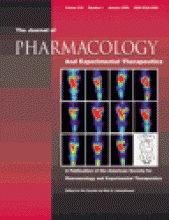Abstract
Glycogen synthase kinase-3 (GSK-3) is critically involved in insulin signaling, and its selective inhibition may present a new therapy for treatment of insulin resistance and type 2 diabetes. The current studies were designed to examine the impact of long-term in vivo inhibition of GSK-3 and its effects in the specific tissues. ob/ob mice were treated daily with one dose (400 nmol, i.p.) of a selective GSK-3 peptide inhibitor, L803-mts, for 3 weeks. Treatment with L803-mts reduced blood glucose levels, improved glucose tolerance, and prevented elevation of hyperglycemia with age. However, L803-mts did not affect either body weight or food consumption and was not toxic, as judged by histopathology and blood chemistry analyses. Consistent with these results, L803-mts suppressed mRNA levels of hepatic phosphoenolpyruvate carboxykinase (PEPCK) (50%) and increased hepatic glycogen content by 50%. On the other hand, L803-mts did not affect glucose 6-phosphate (G-6-P) phosphatase (G-6-Pase) mRNA levels or its enzymatic activity in the liver. Investigation for possible mechanisms responsible for PEPCK suppression indicated that phosphorylation of cAMP-responsive element transcription factor (CREB) at Ser133 was reduced remarkably by L803-mts, which was also associated with reduced phosphorylation at Ser129 and no change in total CREB. This suggested that PEPCK was suppressed by GSK-3 inhibition-mediated inactivation of CREB. In skeletal muscle, treatment with L803-mts led both to up-regulation in GLUT4 expression and to a 20% increase in glycogen content. Our studies show that long-term treatment with GSK-3 inhibitor improves glucose homeostasis in ob/ob mice and demonstrates a novel role of GSK-3 in regulating hepatic CREB activity and expression of muscle GLUT4.
Footnotes
-
This work was supported by the Israel Science Foundation Grant 755/04 and was performed as partial fulfillment of the requirements for a Ph.D. degree (O.K-B.) in Sackler School of Medicine.
-
doi:10.1124/jpet.105.090266.
-
ABBREVIATIONS: GSK-3, glycogen synthase kinase-3; PEPCK, phosphoenolpyruvate carboxykinase; IR, insulin receptor; CREB, cAMP-responsive element transcription factor; G-6-P, glucose 6-phosphate; GS, glycogen synthase; G-6-Pase; glucose-6-phosphatase; FKHR, Forkhead transcription factor; PKB, protein kinase B; IRS-1/2, insulin receptor substrate1/2; GLUT4, glucose transporter 4; GTT, glucose tolerance test(s); PCR, polymerase chain reaction; PCG-1, peroxisome proliferator-activated receptor-γ coactivator-1; UDPG, uridine 5-diphosphate [14C]glucose.
- Received May 31, 2005.
- Accepted September 14, 2005.
- The American Society for Pharmacology and Experimental Therapeutics
JPET articles become freely available 12 months after publication, and remain freely available for 5 years.Non-open access articles that fall outside this five year window are available only to institutional subscribers and current ASPET members, or through the article purchase feature at the bottom of the page.
|






